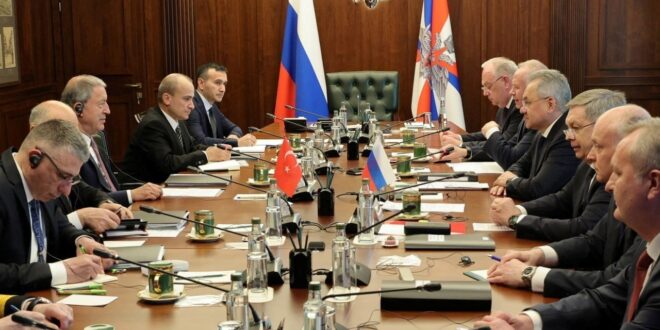Russia’s top diplomat Lavrov teases a possible high-level four-way meeting to tackle Turkish-Syrian normalization, which he says requires many specific parameters to achieve, such as troops’ presence and the YPG problem
Russia, Türkiye, Syria and Iran plan to hold a meeting soon to discuss the normalization efforts between Ankara and Damascus, according to Foreign Minister Sergei Lavrov.
“We made a great effort in foreign and defense ministries to hold meetings last year to discuss conditions that could lead to the normalization of relations between Syria and Türkiye,” Lavrov told RT in an interview on Saturday.
“We now believe it would be reasonable to prepare another meeting. I am sure that it will take place in the foreseeable future,” Lavrov said.
Türkiye severed ties with Syria in 2011 after the outbreak of the Syrian civil war. Ankara backed President Bashar Assad’s opposition and deployed troops to Syria’s north to assist the opposition forces and stave off PKK/YPG terrorists.
Syria’s war began after the repression of anti-regime protests in 2011 and has killed more than 500,000 people and displaced millions. Assad views the Syrian opposition as terrorists.
Türkiye hosts some 3.2 million Syrian refugees out of a population of 85 million, according to United Nations data.
Since 2022, top Syrian and Turkish officials, defense and foreign ministers, as well as intelligence chiefs have met for Russia-mediated talks, with Moscow pushing for a detente.
The last talks in Moscow, including Tehran, fell apart in May 2023.
Russia is still trying to facilitate a meeting between the two countries’ leaders to mend ties. Iraq also said in July that it may seek to try to bring the two leaders together.
“We want our partners in Damascus and Ankara to improve their relations. Both leaders had cordial, personal relations until 2011. I believe this will also play a positive role,” Lavrov argued.
In July, President Recep Tayyip Erdoğan said he might invite Assad, who was once a close friend, to Türkiye “at any moment,” in a sign of reconciliation.
His invitation came after the Syrian leader last month said Damascus was open to all initiatives to revive Turkish-Syrian relations “as long as they are based on respecting the sovereignty of the Syrian state over all its territory and fighting all forms of terrorism.”
Later in July, Assad made clear that while he wanted Turkish troops to withdraw from Syria, that was not a precondition for talks.
The YPG problem
Türkiye says having the PKK/YPG immediately across its border is a grave concern for Turkish border towns that suffered from PKK/YPG attacks in the past.
The YPG is the Syrian offshoot of the PKK, a terrorist group responsible for tens of thousands of deaths in its decadeslong terror campaign to achieve so-called Kurdish self-rule in southeast Türkiye and some parts of northern Syria and Iraq.
The YPG exploited the power vacuum during civil unrest to occupy swathes of land and create a self-styled entity in northeastern Syria. The terrorist group has also found a major ally in the U.S. against Daesh.
Lavrov believes Ankara will temporarily stay in Syria until the country’s territorial integrity and the issue of terrorism is resolved but argued Damascus is being cautious for now in mending ties with Ankara since Türkiye continues to operate in the Idlib de-escalation area and targets PKK/YPG on its border.
He claimed Türkiye was ready to discuss the withdrawal of its troops from Syria but specific parameters haven’t been agreed yet, which includes the return of refugees and the measures to suppress the terrorist threat.
Lavrov also warned the PKK/YPG to remember “what happened to the Afghan administration that decided to trust U.S. promises.”
The Russian minister accused Washington of creating a quasi-state in northern Syria and exploiting the country’s largest oil wells and most fertile agricultural land.
“The U.S. is not fighting (Daesh) terrorism but instead engaged in taking oil, gas and grain out of the country,” Lavrov said.
He also argued the U.S. was “toying with Syrian Kurds” whom he said “must understand their future is with a united Syria.”
The U.S. has kept some 900 troops in the region in 2014 and Washington frequently sends reinforcements to its military bases and points in the oil fields controlled by PKK/YPG terrorists.
Washington’s support for the YPG is also a strain on Turkish-U.S. relations.
 Eurasia Press & News
Eurasia Press & News




